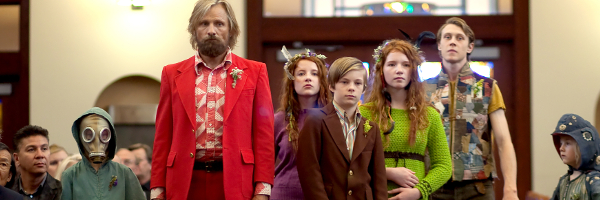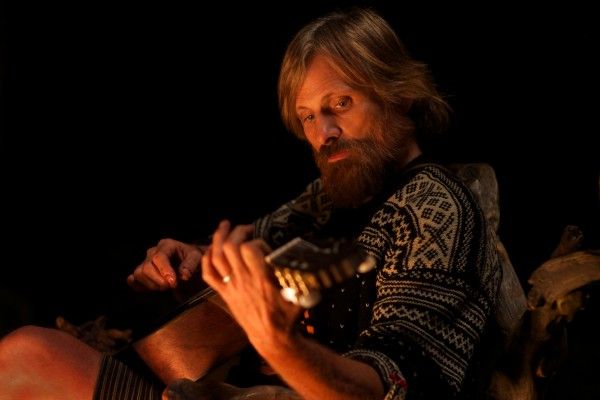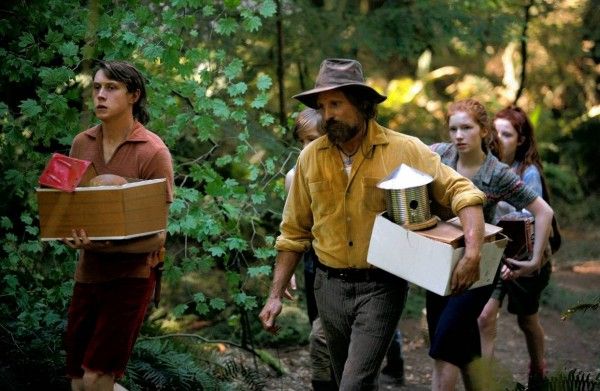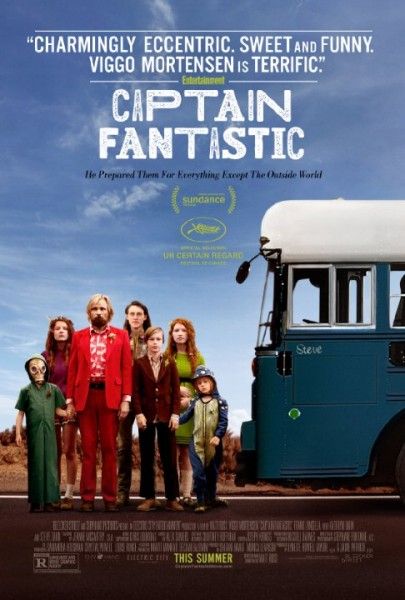If someone decided to adapt a series of cat posters into a feature film, it might resemble something like Captain Fantastic. The film is, on the surface, fairly compelling, offering an interesting set-up for a movie about something more substantial than trite clichés, but it wholeheartedly buys in to empty platitudes as sage wisdom, resulting in a film that’s naïve, disappointing, and immensely frustrating despite a solid performance by Viggo Mortensen.
Written and directed by Matt Ross, the film revolves around a man named Ben (Mortensen), who with his wife Leslie decided to raise their entire family off the grid, in the woods of the pacific northwest. Eschewing traditional schooling and life, the two opted to bring up their six kids with more progressive ideas about the world. Their “training” involves knife-attacks, hand-to-hand combat, and reading every book and novel that would line the shelves of the most pretentious college professor in history. They subsist on the land around them, with the young children hunting for their own food with bows and arrows and knives. They celebrate “Noam Chomsky Day” instead of Christmas (complete with an original song) because they’d rather celebrate the life of a noted philosopher than one of “a fictional elf.” And their parents have banned words like “interesting” in an effort to make their children analytical by nature.
When the story begins, Leslie has been away for three months in the hospital due to a bout with mental illness. When Ben makes one of his semi-regular trips into town to sell their wares and use the telephone, he learns that Leslie killed herself the night before. Leslie’s father informs Ben that if he attempts to go to her funeral, he’ll have him arrested, despite the fact that Ben informs his father-in-law (played by Frank Langella) that Leslie was Buddhist and did not wish to have a traditional Christian ceremony.
After a “very dramatic” scene in which he informs his children of their mother’s fate (his style of parenting is one of absolute truthfulness, no matter the circumstance), Ben initially tells them they cannot attend Leslie’s funeral before ultimately changing his mind, beginning a long and winding road trip to San Francisco via the family bus “Steve,” which is a converted schoolbus complete with bunks and shelves for books, obviously.
While Captain Fantastic is aways compelling, and Ross shows ambitious potential behind the camera in capturing the family’s forest-set life, it is at heart entirely conventional, hitting plenty of the beats you expect it to hit throughout its runtime. Which would be fine if Ben’s philosophy and parenting choices weren’t so absurd. It’s one thing to write an 8-year-old character who can deliver an analysis of the Supreme Court’s decision on the Citizens United case (this actually happens), but to argue that this is an ability that could exist if only every youth were raised like Ben and Leslie’s kids is ridiculous.
The film is incredibly naïve, painting this life and child-rearing philosophy as almost entirely devoid of flaws. It does appear at one point that Ben will finally get his comeuppance and realize that this way of life was an unsound choice that put his children in grave danger, but the movie soon after reverses course and embraces the parenting choices anew. Threads that were planted to confront Ben with the reality of what he and Leslie have done to their children are quickly discarded, and while the film attempts to make small steps towards a lifestyle change, it remains fantastical in its worldview.
Which is frustrating because Mortensen is kind of great in the film. There’s a complexity to the performance that offers shading to Ben, and his arc almost culminates in something immensely fascinating, if only the script had the resolve to fully go there. The movie’s young actors are solid as well, especially Nicholas Hamilton as the one child who seems skeptical about his father’s choices after Leslie’s suicide.
Look, there’s nothing inherently wrong with wish-fulfillment. Fantasy exists as a genre for a reason, but usually there’s some effort to connect with the real world and draw parallels to the hardships we face a human beings trying to live the best life that we can. But Captain Fantastic takes wish-fulfillment to the extreme, presenting fantasy as a reality and eschewing the practicality of social life in favor of offering up this “hippie philosophy” as the answer to all of our society’s problems. Cat posters are cute, and sometimes they offer comfort and a nudge in the right direction, but they are inherently devoid of consideration for the complexity of life. As it turns out, that’s kind of important.
Rating: D+




